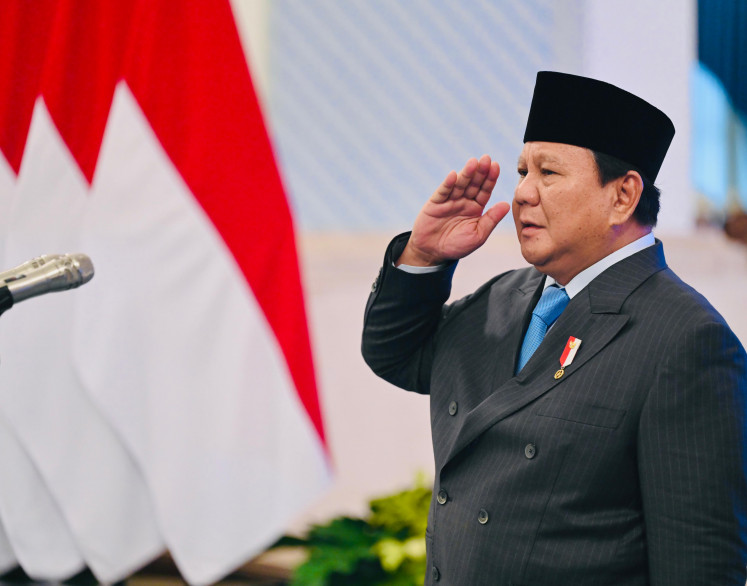Popular Reads
Top Results
Can't find what you're looking for?
View all search resultsPopular Reads
Top Results
Can't find what you're looking for?
View all search resultsFirmanzah: Learn young learn fair
JP/Matheos V
Change text size
Gift Premium Articles
to Anyone
JP/Matheos V. Messakh
Economics might seem dry and practical, but Firmanzah, the new dean of the University of Indonesia’s School of Economics, has a lighter side.
“I like to dream and to make my dreams come true,” the 32-year-old said. “That’s the most romantic thing in the world.”
It’s also very strategic, which is fitting for a man with a PhD in management and a 20-year devotion to Sun Tzu.
When Firmanzah, fresh out of high school, left for Jakarta 14 years ago to try his luck, his mother didn’t want her baby to go (he is the eighth of nine children).
“She was crying along the way in the train asking me to stay and do my study in Surabaya instead of moving here,” he told The Jakarta Post on Tuesday.
But he was determined to study management at UI, which he had decided, after consulting some friends, was best for him because “I like to explore people’s behavior but I like to do it with a solid quantitative methodology”.
Just 14 years later, Firmanzah was elected as the dean of the prestigious economics school, which has produced such noted Indonesian economists as Widjojo Nitisastro, Emil Salim and and
Miranda Goeltom.
At 32, Firmanzah is the youngest dean in the university’s history and perhaps even in the history of the nation. But his youth is not his main selling point: He has solid practical experience and a good academic record under his belt.
After graduating in 1998, he entered the workforce, including as a market analyst for an insurance company and assistant lecturer at UI. He also worked for a management consulting firm at his alma mater while pursuing his magister management degree at the school.
This was followed by another magister degree, thanks to a scholarship to the University of Science and Technology of Lille in France where he studied organization and management strategy.
Firmanzah went on to do his doctorate in strategic and international management at the University of Pau and Pays De l’Adour, which he finished in 2005.
“France is where my intellectuality matured. I did a lot of textual dialogues with many philosophers and sociologists,” said Firmanzah, who despite his French education admires German philosopher Arthur Schopenhauer.
“France is where there is room for as much interpretation as we like but at the same time social order is kept.”
He decided to return to work at UI in 2005, where he held several different positions. In all, he has promoted 10 doctorate students and currently supervises 15 students, and is in the process of getting his professorships from the University of Indonesia and the Paris X University Nanterre. Then his most recent achievement: Being elected as the dean on April 14 this year.
But being the dean is not where it ends – he and others aim to make UI a “world-class university”, for his school to be modern and open, for top Indonesian universities to compete not with each other but with universities elsewhere in the region.
“We have to develop new multidisciplinary areas, open to cooperation with international institutions as well as local and regional institutions.”
It won’t be easy: Lack of government subsidies for higher education is an urgent problem needing a solution that Firmanzah and others believe can be solved through cooperation among universities.
“This is a structural problem for many universities around the country. The revenue from tuition fees will never be enough,” he said.
This means, he said, Indonesian universities are always casting around for money to survive, whereas other universities in the region are focusing on improving themselves.
“The economics school at Melbourne University has a research budget of about $3 billion
a year, while here … we don’t know how much we have because money is scattered across many institutions.”
His other reason for favoring cooperation and a multidisciplinary approach is his belief that economics, as a field of study, cannot stand alone.
“Economics has a strong quantitative methodology but it also has lots of weaknesses so openness to other disciplines is needed.
We are not the last frontier for truth in social science. If we regarded ourselves the only source of truth, we would become fundamentalist scientists.”
The need for dialogue with others is a kind of axiom for Firmanzah, who believes “Today’s leaders should be capable of bridging the gaps between many interests and aspirations because people are getting more and more segmented.” This belief, he admitted, “is perhaps one of the qualities that got me elected”.
Although he said he was just trying his luck when he put himself forward as a candidate, perhaps he was implementing a lesson learned from Sun Tzu, whose works he has been reading since junior high school.
“I have read Sun Tzu maybe a hundred times and I even bought the French version,” he said of the writer who taught him the importance of strategy. “Humanity’s strongest instinct to win battles, which can be applied to any walk of life. Battles are everywhere and what makes the difference between the loser and the winner is their strategy.”
Firmanzah rejects claims he was elected because the university rector’s new regulation on electing deans gave him an easy path. The election followed a two-month rigorous selection process where he competed with his former lecturers and professors.
“I had the highest score throughout several stages of the selection, which was open to the public,”
he said. “The way of being selected by the professors, which we previously used, I don’t think it was democratic either.”










